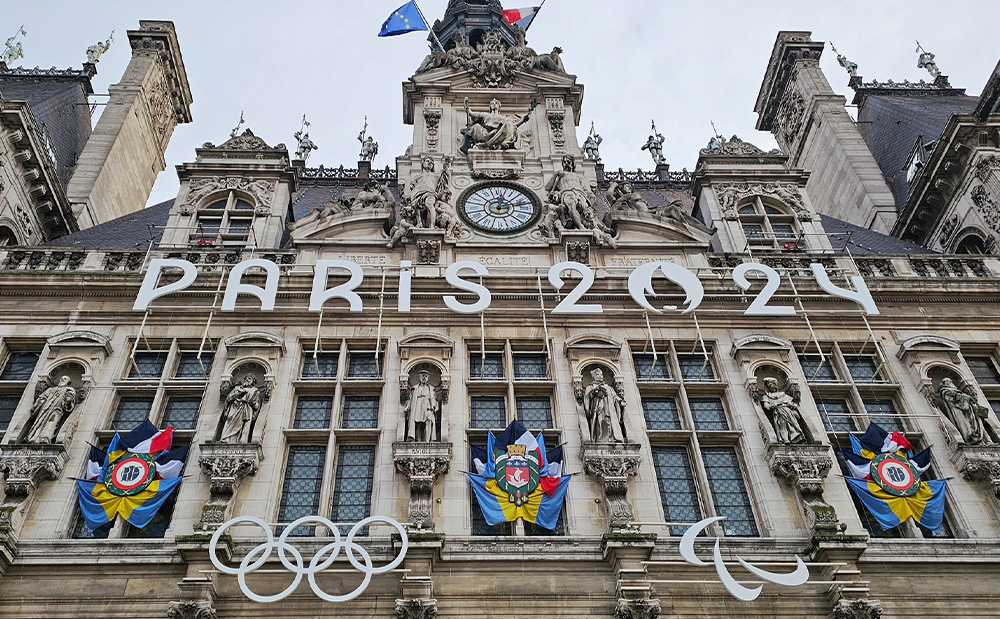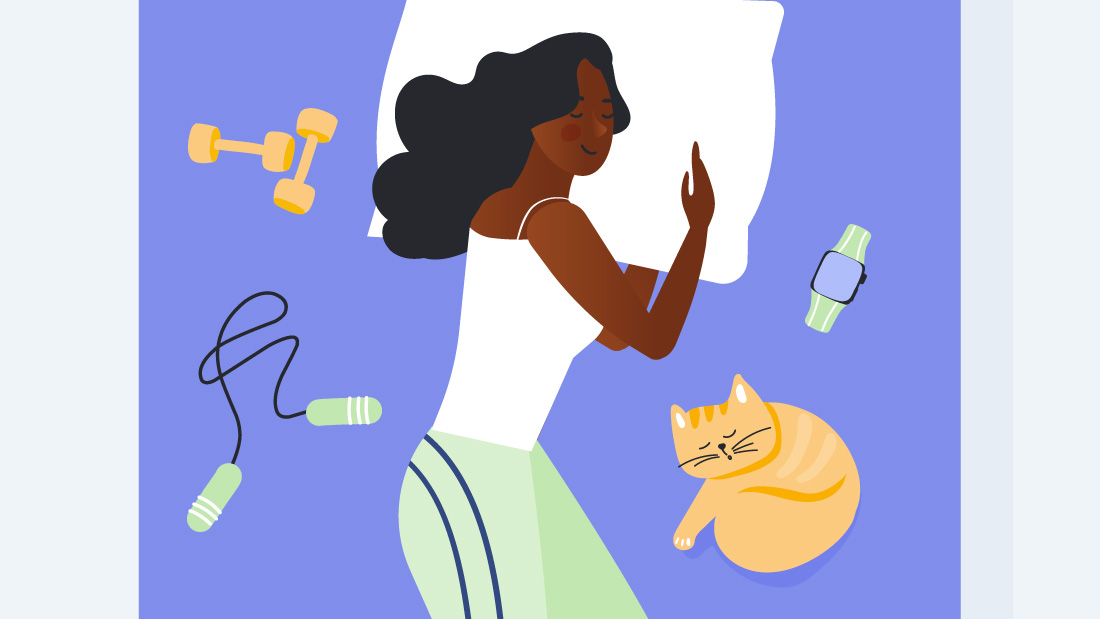
In 2021, seven-time Olympic gymnastics medalist Simone Biles came forward about her struggles with mental health during the Tokyo Olympics, particularly her battle with disorientation during midair twists, which she calls the “twisties.” Since then, improving mental health for Olympians and athletes at large has gained traction.
For instance, the United States Olympic & Paralympic Committee (USOPC) has made considerable strides in mental health services for athletes, focusing on being more proactive with crisis prevention and maintenance. With the upcoming Paris Games, sleep health is a spotlight for preventing the psychological and physical effects of high-stakes competition and travel, according to Jess Bartley, the senior director of psychological services at the USOPC, who spoke to reporters during the Team USA Media Summit in New York.
“We’re going to talk about jet lag and how you can travel with us and how to put your sleep hygiene first,” says Bartley, who began working at the USOPC in 2020 in her newly created position.
Sleep plays a tremendous restorative role in physical and mental wellbeing. For athletes, sleep offers a chance for the body to recover and fine-tune movement memory, which often happens in REM sleep, according to Alex Dimitriu, M.D., who is double board-certified in Psychiatry and Sleep Medicine and the founder of Menlo Park Psychiatry & Sleep Medicine. “Jet lag, long training schedules, and especially late-night meals and exercise can have a negative impact on performance,” he says.
Mental Health and Performance Concerns for Olympians
According to Dr. Mark Aloia, head of sleep and behavioral sciences at Sleep Number and an associate professor of medicine at National Jewish Health in Denver, Colorado, there are at least two factors to consider regarding sleep and performance among athletes.
The first factor is adjusting to jetlag when traveling across time zones. Changes in your sleep schedule and being out of your usual sleeping environment can disrupt your sleep quality. The second factor is the general relationship between sleep and performance. Losing sleep then impacts mental and physical abilities and daytime functioning.
“Making adjustments will not be terribly difficult for most athletes if they do not travel across time zones, but the excitement of being in another place with many other athletes and competing in these games can result in difficulty prioritizing sleep and quelling anxiety,” says Dr. Aloia.
Traveling across time zones can be extra challenging due to jet lag, affecting people differently as their entire system readjusts. According to Dr. Aloia, circadian rhythms are attuned to your time zone, guiding your body to know when to wake, eat, work out, sleep, and more.
“When we travel across time zones, we carry our home routine with us, but we get mixed signals from our new environment that our routine is wrong—waking up when it is dark outside or trying to sleep during the daylight,” he says.
Adjusting to a new time zone is even more difficult if an athlete already has inconsistent sleep and wake times at home—which may be the case when traveling for training and competing leading up to the Games. “If your sleep schedule varies too much day-to-day, your circadian rhythm will be thrown off track, causing you to feel groggy and sluggish throughout the day,” says Dr. Aloia. This inconsistency affects sleep health and, over time, will also impact physical, mental, and emotional health.
Dr. Aloia, who works with NFL teams, finds that players with a more regular and consistent sleep schedule at home adjust more quickly when they travel long distances, and time zone travel makes things even more challenging.
How Sleep Impacts Physical Performance and Motivation
According to Dr. Dimitriu, sleep is fundamental to impulse control, which is the basis for motivation. “Positivity, enthusiasm, and strong motivation are essential to the flow state required for high performers, and good sleep is the foundation,” he says. Adequate sleep also helps athletes push themselves harder, as they are more disciplined mentally and more restored physically.
Your circadian rhythm influences optimal sleep and meal timing, mood fluctuations, and peak alertness, according to Dr. Aloia. “Circadian disruption can also affect performance—for example, think of trying to bring your best to a competition when your body is expecting to sleep,” he explains. Inadequate sleep from disruptions in these natural rhythms can impair athletic performance, reducing reaction time and other abilities.
Circadian rhythm also influences hormone release, which is pivotal in muscle recovery and growth. “Muscles and metabolic processes get a chance to rest and recover during slow-wave sleep, and growth hormone is also produced in this phase,” says Dr. Dimitriu. Disruption or reduction of this sleep stage directly impacts GH release and, in turn, adversely affects performance.
If an athlete and their care team don’t plan and make adjustments for these struggles, they may question their ability to perform when put to the test in such a competitive environment. “The mental game then becomes a challenge,” says Dr. Aloia.
How Athletes and Trainers Can Mitigate Risks
As a sleep advisor for NFL teams (such as the Chiefs, Rams, Cowboys, and Vikings) with Sleep Number, Dr. Aloia knows just how essential sleep is in athletes’ recovery processes. “A pillar of our player partnerships focuses on how quality sleep impacts performance,” he says.
Dr. Aloia and Dr. Dimitriu recommend the following strategies:
- Establish a regular sleep routine before traveling to help adjust to time zone changes. Active people typically need more sleep to help with recovery.
- Gradually shift your sleep schedule to the new time zone before your trip with the guidance of a sleep coach.
- Educate athletes on the importance of planning and prioritizing consistent sleep for mental health and performance.
- Watch metrics of overtraining, such as HRV and lowest nighttime heart rate, to ensure adequate recovery time between workouts.
- Optimize sleeping environments by keeping them cool and dark. Use dim or amber lighting before bed and aim for a room temperature of 67-70°F.
- Use natural light to adjust your body clock to the new time zone. Seek outdoor light in the morning and avoid light at night.
- Develop a bedtime routine that does not involve screens, such as mindfulness, reading, meditation, or calming music, to signal the body it’s time to rest.
- Avoid screens, such as phones or other devices, before bed due to their stimulating effects.
- Maintain regular mealtimes to help set your internal clock and adjust to the new time zone.
- Bring a familiar pillow, sleep mask, and earplugs, or consider using white noise machines for consistent background noise to combat less-than-ideal sleeping conditions.

Cardboard Beds Have Returned to the 2024 Paris Olympics — Here’s What You Need to Know

Airweave Mattress Review

Athletes And Sleep

How the MLB’s New Pitch Clock Is Giving Baseball Players a Better Night’s Sleep
Sources
Dimitriu, Alex. Author interview. April 2024.
Aloia, Mark. Author interview. April 2024.